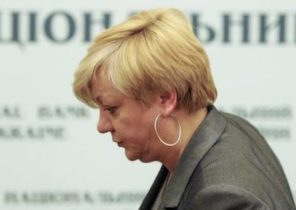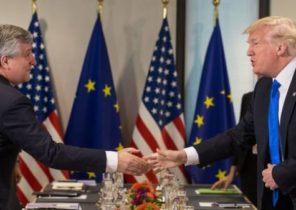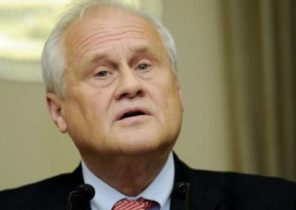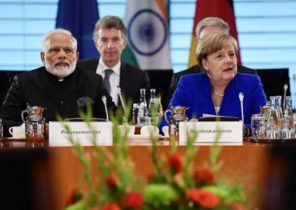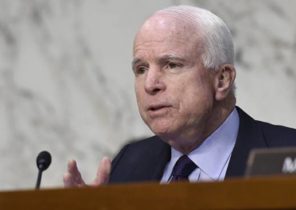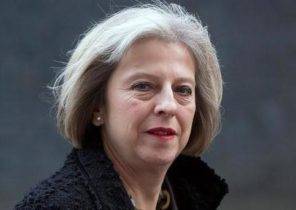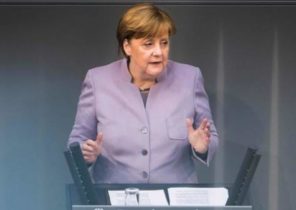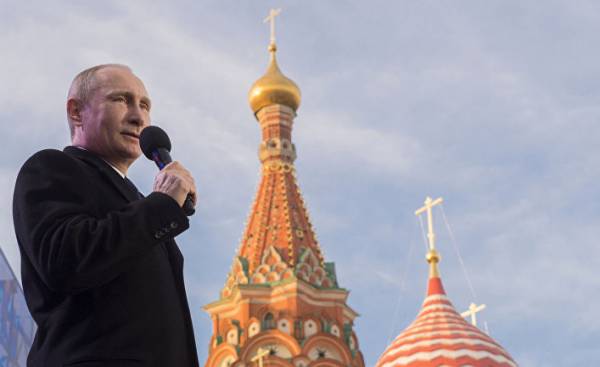
He arrived in Moscow a student and left as a journalist. For four decades the Soviet adventures he had the opportunity to witness the fall of communism, the transition from the USSR to the new Russia, change a succession of leaders starting with Brezhnev and ending with Putin. Jose Milhazes (José Milhazes) talks about his new book, “My adventures in the land of the Soviets” and that led to its creation.
On this day, Jose had every reason to feel happy. He had to Board the train bound for “Paradise on earth”. The locomotive was steam-powered, and left Jose has historically been very backward country. But, as expected, in front of him had perfect model of the future society. He, a Portuguese student from a poor family, “going to live in an almost perfect society in the process of transition from the developed socialism to communism” in the Soviet Union. A Jose took quite a bit of things: a cardboard suitcase, a pair of leather shoes, some clothes and two books. What more? Indeed, in the “earthly Paradise”, everything is there!
So 9 Sep 1977 in Povoa de Varzin began a Saga that lasted nearly four decades. It is with anticipation that out of the book, josé Milanese “My adventure in the land of the Soviets — the Soviet Union man I know” (As Minhas Aventuras no País dos Sovietes — A União Soviética tal como eu vivi a) published by Oficina do Livro. When in its incomplete 19 years old, Jose went on this trip, he had no idea what awaits him, even on arrival. It is the desire to take a critical look at the past, talking about it in the first person (and it is emphasized in the title and subtitle of the book) prompted Jose Milanese to reconsider the way he has done from student to translator and journalist, correspondent for TSF radio and the newspaper Público. Currently, after his return to Portugal, he is a political commentator for the TV channel SIC and RDP (“Radio and television of Portugal”), as well as a columnist Observador.
But how was the idea of moving to “Paradise on earth”? Born the second of October, 1958 in póvoa de Varzin “family fishermen”, Jose Manuel Pinto Mileses decided to take the mother’s surname, not the father, because he at school already there were a few students with last name Pinto. And Milanese was only one of him. As a boy, Jose enrolled in the boy scouts. “The scout movement — he explains now, some contradicting the recollections contained in the book allowed me to do what until then I had no opportunities to engage. So, parents could not buy me a bike or a train ticket. If I hadn’t joined the scouts, you might become a member of the Portuguese youth organization, who knows. It was always a good opportunity to discover something new, something to participate. To meet other people, to visit other regions of the country.”
And after scatsta came the Seminary. “I chose religion because I wanted to be a priest. In my family for several generations men spent long periods away from home. Fishing, Africa, Brazil all the time we were separated. In my childhood I often heard stories about his great-grandfather, who went missing in Manaus, or another fisherman, who got himself a Brazilian mistress. It was always stories of those who were not with us”. The thought of becoming a priest, he was also born after these stories. “Stories about the distant countries and those unfortunates who languished there, not knowing about the soul and that’s exactly what we heard from our relatives or neighbors. Another source of knowledge for me was the old numbers of the newspaper Primeiro de Janeiro and Comércio do Porto. Because in our house there were no books. I read old Newspapers that my mother would wrap the pots with lunch for the fishermen who went to sea”.
So Jose Milhazes joined the missionary order of Comboni and after April 25 they change from one faith to another. It was then that he entered the UEC (Union of Communist students) associated with the PCP (Portuguese Communist party). This organization and gave it a “pass” to study in the Soviet Union (USSR). “I had simple answers to complex questions, he admits today. Is this faith or fanaticism —had us all in heart and soul to follow those ideas, which, it seemed, was very close, made us think that with their help it is possible to enable”.
Russian “tramp” and “Savior”
The Soviet Union, which Jose Milhazes arrived on 10 September 1977 on the train at 20.40 (local time), no longer exists. In that year a full-fledged leader of the country was Brezhnev. Today, restored to its former level, Russia has a new face, one that seeks to assert his own position in the world: Vladimir Putin. Jose Milhazes was a witness of his exaltation, the death of Brezhnev, watched the changing of the elderly Soviet leaders (Andropov, Chernenko).
He, like many, welcomed the arrival of Gorbachev, which came the populist Boris Yeltsin, “the Donald trump of the then era.” In fact, it was during the Yeltsin post-Communist Russia experienced its worst period. “Yeltsin was only interested in one thing: the independence of Russia. Because he wanted to first bring it under control. And he succeeded, though at the cost of collapse of the whole country…” In that period there were oligarchs, poverty, looting and banditry have become “normal”. To the question about who they would like to be when you grow up, many students answered “bandits” or “prostitutes”. “Because they all earned! People were confused and tried to somehow get out”.
It was at that time and there was Putin, Prime Minister since August 1999 and then acting President (these positions he in turn holds to this day). “Yeltsin was already a sick man, a puppet in the hands of oligarchs, and here comes a young man of intelligence, radiating confidence and claims that in 15 years Russia will overtake Portugal.” As pointed Milhazes, neither this nor many other of his promises he never fulfilled, but it had no effect on his stay in power. “Here lies a phenomenon that many people don’t want to admit it, but that is what we are seeing today in the case of trump and any other populist. People adjusted to such a limit of suffering, humiliation and insecurity that when they promised soon to give what they lack, they agree, and “sell” half of their freedoms, or even all at once.”
In this new phase, says Jose Milhazes, “there are two periods, and the second isn’t finished yet. First period — the arrival of Putin to power. At that time the oil price experienced not the best times. And Putin had a unique opportunity to modernize the country. But he did not. But was replaced by oligarchs own friends. When a lot of money, you can easily breed social demagogy. In addition, the standard of living in Russia has increased, the middle class has grown (to 12-13%), and pensions rose even to the most impoverished layers of the population.”
And what was less? Freedom. Today, foreign correspondents again perceived as an inconvenience or a danger. Sufficient conditions for journalistic work in Russia forced Milanese to return to Portugal. “The country is not returned to the era of communism, but could compete with her at the absurdity of what is happening,” he writes in the last Chapter of the book. Another reason for leaving was the social environment. “One event of the recent past marked the fracture even within the Russian society: it is the occupation of the Crimea. The invasion and all its related propaganda have changed many people. All of a sudden my former classmates, are absolutely normal people, which I think is advanced committed to European values, showed incredible nationalism”. The desire for expansionism? “Of course! And, as it turned out to be a great success”.
The CIA as an excuse
Russian expansionism of the Soviet era, the former a continuation of the expansionism of the tsarist regime, but under the banner of the hammer and sickle, seemed to the young student who had just arrived in the Soviet Union, no more than an abstract idea. Was the desire to spread socialism in the name of prosperity of the peoples. “This ideology promised Paradise in our earthly world, and thanks to her we began to believe in historical determinism. We were ready to do everything we can to serve the cause of building socialism and communism”. Perhaps that is why, thinking of moving to another country, Milhazes imagined is not the Soviet Union, but Bulgaria, East Germany, and even Cuba. He wanted to be present during the construction of socialism and to participate in this process and not to observe it has been completed. But he sent it to the Soviet Union. On arrival the young man was waiting for a big surprise. “They began to ransack our bags. Imagine this: we arrive, we can say, to heaven, to our fellows who already have the experience of living in Paradise, and the first thing they do to us, checking documents and bags, and we’ll just shrug”. The situation seemed odd to the young man, but the ideology helped her take: “It was a struggle with the CIA, because the CIA could penetrate the Soviet Union and to make troubles. So it was a kind of socialism! Conditioned reflex, like Pavlov. For the first time there are excuses: the CIA, imperialism, the representatives of the exploiting classes, which allegedly are not asleep, although so many years have passed”.
In Moscow Milhazes moved from UEC in PCP. “It was quite formal transition. I would in any case become a member of the party, of course, if I were some kind of serious misconduct. This is not a promotion, rather — the next stage of growth: I had to leave the UEC to enter the PCP”. With the Russian language was initially the problem. But “had to learn to communicate, to read, to go to University — in fact it was what I wanted.” So Jose began his studies with zeal. “Grammatically Russian language is a complicated beast. But because at the University we didn’t have written exams, we really never paid much attention to the written word. We had to learn first to speak and to understand.”
Outside of school, Jose started to do the translation. First it was movies (“easier and not so responsible”), and then, when he graduated from the University, a formal speech. “We could only do written translations, simultaneous, never. They dealt exclusively with Soviet specialists”. It was sad, and that speech was very similar to one another and are often repeated. “Because these 80-year-old old and already barely uttered words, speech should have been done as simply as possible”.
But as Jose has mastered the Russian language, he began to better understand Russian. And it helped him for the first time to question their former beliefs. Constant queues for essential commodities, polysoprene and banned books, the hidden anti-Semitism among the population — all this made him often wonder about how “heavenly” was the Soviet state. “This is a very slow process, because there is a braking factor: resistance. The building starts to crumble, but we don’t want to believe that it will collapse. Because it means the end of what we believed. Also, when Mikhail Gorbachev and launches his reforms, a glimmer of hope that you can build such a socialism with a human face”.
The rise and fall of Gorbachev
Gorbachev came to power during the rise and fall of the decrepit leaders (Brezhnev, Andropov, Chernenko). It happened in 1985, then at josé Milanese and his wife, the Estonian Siiri (they were married 10 may 1983 and are still together) my second son was born. “When choosing the next Secretary-General, the people already began to laugh, because all the mind immediately came the thought of his imminent funeral. It is no coincidence that this period has gone down in history as a period of stagnation. Propaganda was telling us the same thing, but we saw that the country was experiencing stagnation.” Gorbachev brought hope. “It was a kind of April 25. People arguing, reading this was a unique experience. Early in the morning the people stood in line at newsstands to buy Newspapers”. But lasted all long. “I am convinced that Gorbachev came to power, thought that his possession is at least minimally organized and viable country. But it wasn’t. And when he begins to remodel the building, he realizes that everything could collapse. He is desperately trying new ways, but the problem was hiding in the basement”.
Meanwhile, Gorbachev has overtaken the reality. Communism began to crack, at first took the form of nationalism, growing popular discontent. The first of may 1990 for the first time in Soviet history sitting in the stands of the Soviet leaders booed by the participants of the demonstration. Hear the cries of “Down with Gorbachev!” and “Down with the CPSU!” For josé Milanese it was “a clear sign that Gorbachev has overtaken that he was a conservative. The process went so fast that he is behind him could not keep up”. Until then, “the Soviet Union cemented the fear and terror, not ideology.” When the fear began to dissipate, “everything went wrong”.
In the Gorbachev era, the United States treated the USSR quite friendly and fatherly, first under Reagan and then under Bush. Remember the frozen chicken legs that were brought from America to fight the Soviet food shortages, the famous “Bush legs”. “Chicken legs still cause my children have inadequate reaction, says Milanes. — Then I found out that Americans don’t like to eat chicken thighs, preferring them wings”.
But when there is Yeltsin, not even the United States are trying to prevent the “fall” of Gorbachev. “People in the Soviet Union, especially Russian, feel humiliated, because at a time when Gorbachev was especially needed support, he pulled the rug from under his feet and supported Yeltsin, unpredictable policies, which, however, made it clear that he intends to kill whatever was on the Union. I am sure that Gorbachev could remain part of the Union. Baltika has been lost due to historical circumstances, Georgia is also because of the strong nationalist movement, which there has always been, Azerbaijan, probably also would be separated. But the whole of Central Asia and perhaps even Ukraine could remain in the Union, and as a result we would have a serious Federation or even a Confederation.” But Gorbachev lost his place came Yeltsin who opened the way for the rise of Putin.
According to josé Milanese, “Gorbachev is in this story a tragic character, a failed reformer. Failed because not able to fully implement his ideas and intention. Of course, if you look at it through the prism of the destruction of the Communist regime, he is very successful. However, this destruction was not in his plans, Gorbachev fought to the last for the Soviet Union and the regime that in the end — if his ideas are implemented — could become a social democratic regime. Because he was a social Democrat”.
The Danger Of Putin
Putin is a completely different figure. He brought in his rule a healthy pragmatism. But has not fulfilled what was promised to the Russians. “Today’s Russia is far from prosperity and does not Shine with innovation. She is behind the train of modernization, and this is the fault of Putin. Because the whole flow of petrodollars have gone into corruption.” Is it possible to return to the path of modernization? Jose Milhazes is under no illusions. “There must be a lot of work and profound reforms. You want to upgrade a large part of the infrastructure and to make foreigners want to invest in Russia for the future, not only to earn quick money. Because today is happening the same thing after the collapse of the Soviet Union, the brain drain. People with higher education went to the United States. Now we see the Nobel prize laureates with Russian names who are working in other countries.”
In such adverse circumstances is the second period of the Kremlin of Vladimir Putin: “Now begins the second part, but we still don’t know how it will end. Putin is increasingly engaged in a different kind of adventure, not being sure whether his country to withstand them. The war in Ukraine, intervention into Syria and possible future intervention in Afghanistan. The destabilization of Central Asia may be fatal for Russia, this is a huge area in which Russia, she said, particularly interested. And if Russia starts there to sink, the situation could worsen in earnest. And it may be true that Putin is digging the grave of their own country.”
